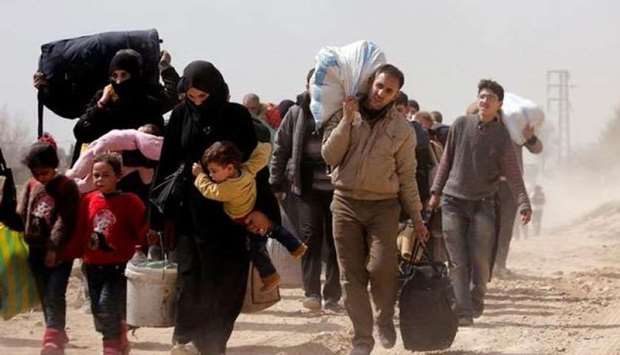Mediterranean countries say they have taken a key step towards finding out the fate of thousands of migrants -- many fleeing Syria's war -- who have gone missing while trying to reach Europe.
At a meeting of the International Commission for Missing Persons in The Hague this week, Cyprus, Greece and Malta pledged to coordinate and beef up their efforts to trace nearly 18,500 migrants who have disappeared since 2014 while making the perilous journey across the Mediterranean.
Italy -- which has taken a hard line on migrants under its populist government and interior minister Matteo Salvini -- did not sign up to that new joint statement due to what the ICMP described as internal government issues
The four countries are the main point of entry to Europe for many of the migrants fleeing the war in Syria and other regions.
Finding out what happened to those missing -- whether they are eventually found alive or whether they have been confirmed dead and their remains found -- provides crucial closure for families.
‘We are starting a process that is extremely important,’ Queen Noor of Jordan, one of the ICMP's longest-serving commissioners, told AFP in an interview.
‘Helping the families and communities that have lost their members in conflict can create a path to truth, justice and reconciliation -- and where possible, accountability,’ said the Jordanian royal.
Born out of the conflicts in the former Yugoslavia and set up in 1996 in Sarajevo by then US president Bill Clinton, the ICMP uses increasingly sophisticated DNA technology to trace missing persons.
It has already succeeded in identifying around 70 percent of the 40,000 people who went missing in the Balkans conflicts of the 1990s, including around 90 percent of the nearly 8,000 killed in the 1995 Srebrenica massacre.
But it is now turning its attention to one of the biggest human catastrophes of recent times -- the migration crisis that has hit the Middle East, North Africa and Europe since 2014.
- 'Give them hope' -
The plan to better locate and identify missing migrants fleeing conflict and economic hardship in the Middle East and Africa was launched in Rome last year.
But this week's meeting of the southern European states was key to pushing the process forward.
Top ICMP representatives nevertheless called for more to be done to help find the missing migrants, particularly those from Syria's war where the fate is of an estimated 85,000 people is not known.
‘What we are implicitly saying to states is that they have a responsibility to deal with this, but that it is also in their interest to deal with it,’ former Dutch foreign minister Bert Koenders told AFP.
The ICMP also wants to obtain permission from Syria's neighbours to start mapping the thousands of refugees fleeing the bitter eight-year war -- in a move that could one day help identify war crimes, Queen Noor said.
Collecting and having access to data about these refugees will make it easier in future to identify ‘where crimes may have occurred, where mass graves exist -- and where families and relatives may be,’ she said.
But the longer-term aim is to bring millions of displaced people back to their homes.
‘I can see in a future that is hopefully not too far off that we can set in motion steps that will provide greater hope for many of the migrants and refugees to Europe.’
‘To give them hope that they can return home,’ she said.

